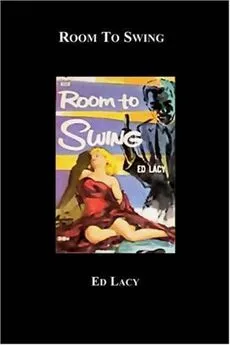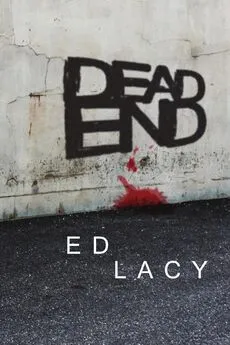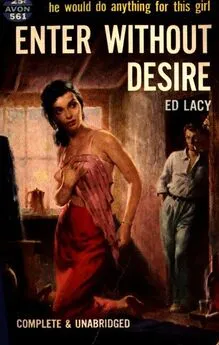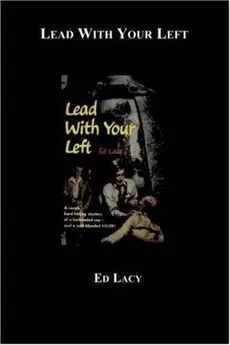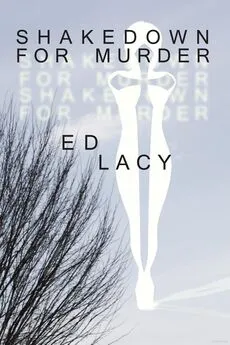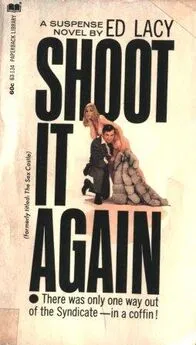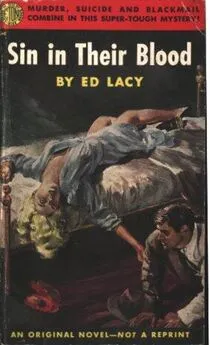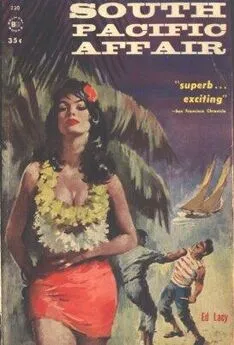Ed Lacy - Room To Swing
- Название:Room To Swing
- Автор:
- Жанр:
- Издательство:неизвестно
- Год:неизвестен
- ISBN:нет данных
- Рейтинг:
- Избранное:Добавить в избранное
-
Отзывы:
-
Ваша оценка:
Ed Lacy - Room To Swing краткое содержание
Room To Swing - читать онлайн бесплатно полную версию (весь текст целиком)
Интервал:
Закладка:
I wanted to think; I had to think if I wanted to get out of this mess. But I hadn't slept in two days and the bed was soft as a good dream. When I jerked myself awake the pale green hands on my wrist watch said it was ten o'clock. I'd pounded my ear for a dozen hours. I felt great—and mad as hell at wasting all that time.
I pulled up the shades; it was very dark outside, the dim street lights blocks apart. My wash was dry and I got my pipe working as I dressed. It wouldn't be safe to hang around this burg for more than a day or two, if it was safe at all. Normally it would be a cinch to shake a little town like Bingston clean in two days, only it was south and I had dark skin. I'd stand out and somebody would peg me as “the" Negro being hunted by the New York police.
I was too much of a stranger. If I only had a contact, somebody in town to do the more obvious asking around. Old super sleuth me, what asking? I didn't have one idea as to what I was looking for. A hick town could be either a wonderful hideout or a trap.
Taking out the TV data on Bob Thomas I read through it for the tenth time. I felt a little better, still had a hunch the killer had to come from Bingston. Unless it was a freak job, one that didn't fit any pattern. If it was a crazy killing, then I might as well go back and put it down in the electric chair.
The house was so quiet I knew the old couple were asleep. And I was hungry enough to see what the refrigerator held. The TV was on, giving the parlor an unreal glow. There was a young girl watching the screen. I could see her face clearly, a lean dark face, skin as dark as mine, hair piled atop her head au naturel. When she saw me she stood up and turned on a lamp. She was wearing a simple knitted gray suit that clung to her tall, strong figure. In the light she looked older than I thought, about twenty-seven. Her nose was short, her eyes large and deep, and she had full, heavy lips.
“Mr. Jones? I'm Frances Davis. Mom said you might want supper. Do you?”
The voice was low and sullen, maybe even bitter. “Where is everybody?”
“Asleep. It's after ten—late for us.”
“Sorry I kept you up. I'll go out and grab a bite.”
“Where? There ain't any 'coloured' restaurants here. You didn't keep me up; I'm a TV bug. If you want to eat follow me into the kitchen.”
“Doesn't seem much worth getting up for at any time in Bingston,” I said as she walked by me toward the kitchen. She was about six feet tall, and in flat shoes.
“Not if your skin isn't pale.” She stopped in front of me. “Your shoulders make you seem short. You're not. And your clothes—they're the end. You're really togged down.”
Up close her face looked a little on the cute side, the heavy lips and eyes interesting. “Thanks, honey. I like your suit too.”
“Bought it in Cincinnati last year. How did you break your nose?” she asked, opening the kitchen door.
“Played football a lot of years ago. Had a pigskin scholarship—till the war came.” The kitchen was big and bright, and a little crazy: very modern refrigerator and freezer, electric washing machine and electric grill—and an old-fashioned coal-burning stove polished a glistening black. She pointed toward a white table and I sat down as she took various pots out of the refrigerator, which was stocked with food. “Greens, rice, roast pork, biscuits, potatoes, and pie. Coffee or tea. Okay?”
“Fine, but I'll skip the biscuits and potatoes. And tea.”
“What's your instrument and what band are you with?”
“Drums. I'm not with any outfit at the moment. Been playing a few club dates down in New Orleans and Lake Charles—heading up to Chicago for some more. Mostly wild-cat jobs.”
“How's New Orleans?”
“Hot and damp. I was glad to blow the city.”
“Man, I dug your Jaguar outside. It's the greatest.”
“Honey, why don't you cut the phony jive talk?”
She turned from the coal stove, which must have been going all the time—the kitchen was overwarm. “I was putting it on for you, being you are a jazz man. Speaking of phony things, stop calling me Honey.”
“Okay, Miss Frances. And I didn't mean to talk out of turn.”
She gave me a quiet stare as she started loading my plate. “I took it as a compliment, Mr. Jones. Tell me, why did you come to Bingston?”
I didn't get the compliment angle. And it was time I started asking questions. Between mouthfuls of the fine food I said, “No reason, merely passing through and thought I'd rest up for a couple of days. I was reading the Bingston paper this morning; seems like you had a little excitement here—a local lad was killed in New York. Did you know this Tutt—or Thomas?”
“I remember him but I didn't know him. He was white. I read about his being killed. You know, the older I get the more I'm convinced whites are crazy.”
I nodded, swallowed a lot of rice. “You remind me of my old man. He was a nationalist. Last thing I expected to find... here.”
“You mean in this wide-spot-in-the-road,” she said, sitting opposite me, nibbling on a small hunk of pie. Her brown skin looked velvet smooth, and the kitchen light showed rather high cheekbones. “We didn't have to fight for integration here—this isn't really 'South.' Yet Bingston is a prison with colour bars. A Negro girl can only work at certain jobs; she has a choice, or a chance, of marrying only two or three single men; must live within a certain area; can't eat anyplace but— But you know that too.”
“A small town is a small town, even for whites.”
“And ten times as small for us!”
“Must be buses leaving here every day. This Thomas guy took off, and look how he ended up. What does Bingston think of his murder? Any—eh—fuss because a Negro was supposed to have done it?”
“It was different for him here; he was white, although a poor one. They even were doing a TV show about him. Sometimes I think of trying to make it in New York or Los Angeles—but I'm scared. You can be lonely in a big city too. Be different if I knew people there. And I've seen pictures of the Harlem and South Side slums, know they aren't any paradise.”
“True, but at least you have more room to swing. Maybe this Thomas swung too wide?”
She shrugged her shoulders, seemed to have larger breasts than I'd thought. “I dream a lot about leaving here. Sometimes Bingston seems a living cemetery for me. Then I tell myself I'm living in a comfortable house with my folks, why should I run away? This is my town as much as the ofays'—why give it to them?”
“Doesn't Ohio have a civil-rights law?” I asked over another forkful of rice and gravy. Her words were giving me an idea—if I worked it right maybe I'd found my local helper.
“You mean do we fight back? Sure. As I told you, it isn't the actual law here as much as custom. But in the long run they mean the same thing. We're only a handful and most of us have 'good' jobs. For instance, I could make and save a lot of money as a domestic. But a few of us try to raise some sand—we've just won a two-year fight to sit in the orchestra of the movie house instead of the balcony. Big deal.” She shook her head. “I shouldn't say that, it was a big thing. Only—damn, there has to be more to living than sitting in the orchestra.”
“What do you do? Going to college?”
“My brother is at Howard. It makes me burn, Pop insisted on sending him to a coloured college. I wanted him to go to Ohio State. Another lost battle. I couldn't go to college. It wasn't a question of money—I'm just a female and marriage should be my career. Bunk!”
“Your folks are old-fashioned?”
“Pop finally sent me to a business school up in Dayton, as if anybody needs a brown secretary in Bingston. I work as a part-time typist for Mr. Ross, a mealy-mouthed tan lawyer and real-estate hustler. Has a family and a hobby— making passes at me. I also have a part-time job in a bakery a few blocks from here—result of another battle. That's what kills me; you have to fight for a lousy job selling cakes. Want your tea now?”
“Yes, thanks.” I cut into the pie. It was wonderful. “Has this Thomas killing started any feeling here against coloured?”
“No. If anything, people are relieved that he's dead.”
“According to the papers he was a one-man crime wave before he took off.”
“He broke out of jail.”
“He was in for rape and assault, wasn't he?”
She got up to get the tea. For no reason I noticed her legs were strong and not skinny. I sugared the tea as she sat down again, took out a pack of butts. I pointed to my pipe sticking out of my breast pocket as I got a match working. She blew a small cloud of smoke at the ceiling, said nothing. “Rape and assault. He must have been a sweet character,” I said, trying to get back to Thomas.
“That was a joke—the rape part. Porky Thomas never had to rape May Russell.”
“Porky?” This wasn't down on my data sheet.
“He was always hungry as a kid. He'd eat anything, like a pig. But why talk of him? He just got what a black boy gets every day If he steps out of 'line'—framed. Did you buy your Jaguar in England?”
“No.” I wondered what she meant by Thomas being framed. “Did Porky...?”
“I thought maybe you traveled abroad with a band. I'm saving for a trip to Europe. My favorite daydream.”
“That's one thing we have over the ofays; leaving the States is more of a joy for us.”
Her eyes sparkled. “Have you been abroad?”
“Paris, Berlin, Rome, Leghorn. I was a captain in the army,” I said, talking too much. “What did you mean by saying Thomas was framed?”
“A captain—well! I wanted to join the WAC's once, to travel. How is Paris, really, how is it?”
“Wonderful. Look, about—”
“Imagine being able to walk anyplace without even wondering if you're welcome. Seeing your car set me dreaming again. Those bucket seats, they're so different.”
“Care to take a ride? Any place we can stop for a drink?”
“Thank you but I don't want to take a ride,” she said, but I knew she did. “There is an after-hours shack out in the country where they sell bootleg stuff. But it's a depressing, dirty place.”
I stood up. “Then let's just take a ride.”
She didn't get up. Looking at the table she said, “No.”
“Come on, I want to see the city.”
“At night? No, Mr. Jones, it sounds too much like the well-dressed city smoothie giving the country-bumpkin gal a break.”
“What?” I laughed. “I'm not going to make a pass at you. Not that you ain't pretty, but I won't make play. Or do you think I will?”
“I think you're a liar, Mr. Jones.” She said it softly, staring up at me with bold eyes. “You told Pop you were driving all yesterday, why should you want to drive some more? You talk of New Orleans and Chicago but your car has New York plates. Exactly what are you doing in Bingston?”
“I told you, merely resting...”
“I know what you told us.”
I didn't know what to say; wondered why I was suddenly frightened of this young girl. I stood there like a dummy for a second, then for no reason I pulled out my wallet, asked, “Should I pay you now for...?”
Her eyes stopped me, although she didn't say a word for a moment; then she said, “Oh... put your damn money away! Do you think I'm asking because I'm afraid you'll run out on your bill? Maybe you're right, money-grabbing is another small-town hobby. My God, Pop and Mom, they just sock it away.... All the time I was a kid, even when I was in high school, I rarely saw Mom. She was cooking and busting suds in a white house, even bringing home leftover food for us. And Pop making as much as anybody else in town!”
Читать дальшеИнтервал:
Закладка:
